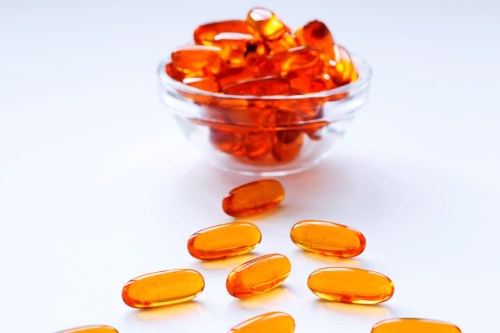What’s better for your bod: fish oil or krill oil supplements?
Krill oil and fish oil are two of the most popular omega-3 supplements. Here, a dietitian compares and contrasts the two, and gives tips on how to buy them.

The vitamin aisle can be an overwhelming place—like, more baffling than figuring out what kind of sneakers you should be wearing to bootcamp class. The sheer number of supplement options alone is enough to cue vertigo.
Take omega-3s, for example. I thought fish oil was the end-all, be-all, but now it seems so many people (particularly people on the Bulletproof train) are touting the benefits of krill oil. But what the heck is the difference?
To find out, I checked in with dietitian Whitney Crouch, RDN, CLT. While both krill oil and fish oil contain the omega-3 fatty acids EPA and DHA—the ones credited with improving cardiovascular and cognitive health—she says there are a few key points of difference between the two.
Supplement showdown: Krill oil vs fish oil
First up: Both fish oil and krill oil are animal sources of omega-3s with slightly different origins. “Krill oil is derived from krill, which are small crustaceans,” Crouch explains. “Fish oil is derived from fatty fish, often sardines, anchovies, mackerel, and salmon.”
One key difference between the two, she says, is that the EPA and DHA fats in each one take slightly different forms. “The fatty acids found in krill are delivered to the body in phospholipids (PL), while the EPA and DHA found in fish oil is delivered in a different formulation called a triacylglyceride (TAG).” She notes that although krill oil was once thought to be more bioavailable than fish oil—in other words, more easily utilized by the body—a more recent (albeit small) study found that they’re equally bioavailable when EPA and DHA doses are matched. So basically while they deliver omega-3s to your bod in different ways, they’re probably equally effective at getting the job done.
The other difference, says Crouch, is that krill oil contains a few nutrients that aren’t found in fish oil. “Krill oil has a naturally occurring antioxidant called astaxanthin and vitamins A and E, which may play a role in further reducing oxidative stress and inflammation,” she says. “It also contains choline, a compound similar to a B vitamin, which reduces homocysteine [an amino acid linked with heart disease], transports different lipids, and is involved in the synthesis of neurotransmitters.”
For those of us on a budget, you should know that krill oil is generally a bit more expensive than fish oil (although that cost varies from brand to brand).

Is there anyone who shouldn’t take krill oil or fish oil?
While the buzz around krill and fish oil might lead you to believe they’re the holy grail of supplements, they’re actually not for everyone. “Anyone with a known shellfish allergy should use krill and fish oil with caution, if at all,” says Crouch. Even if you’re not specifically allergic to krill or fish but have some kind of seafood allergy, Crouch says you should still be careful because cross-contamination is possible. Check with your doctor to consider whether vegan-friendly, algae-based omega-3 supplements could be a better option.
Crouch adds that there are a few other medical concerns that could preclude you from using high-dose krill or fish oil supplements—namely, if you’re taking prescription blood thinners, have a blood clotting disorder, have low blood pressure, or are on blood-pressure lowering medication (because excessive amounts of fish oil could increase your risk of bleeding). Again, talk to your doc about alternate omega-3 options if this applies to you. (And if course, in case it’s not already clear: krill oil or fish oil supplements are not vegan-friendly!)
What to look for when you’re buying krill oil or fish oil supplements
Your first step when considering fish oil vs krill oil supplements should be talking to your doctor to see whether you need them at all, especially give the above-mentioned medical concerns. But if they’re on-board, you should look for a bottle that has a dosage of 1000mg of DHA and EPA combined. And stick to the recommended dosage, since too much fish oil can cause some super-fun side effects like bad breath, indigestion, and nausea.
Crouch says it’s also important to ensure there isn’t any, um, fishy stuff in your pills. “Look for brands that are free of impurities and contaminants like heavy metals and environmental pollutants,” she says. An easy way to do so is to see if a brand has an NSF or USP seal, which means that ingredients have been independently tested for quality (not efficacy).
The bottom line: Both fish oil and krill oil supplements are good options to add if you’re not getting enough omega-3s in your diet, provided your doctor is cool with it. They’re equally effective, although you get more antioxidants with a krill oil supplement.
Everyone in LA is buzzing about sulfur supplements—why, though? Another on-the-rise vitamin trend: Getting your nutrients in IV-drip form.
Sign Up for Our Daily Newsletter
Get all the latest in wellness, trends, food, fitness, beauty, and more delivered right to your inbox.
Got it, you've been added to our email list.










